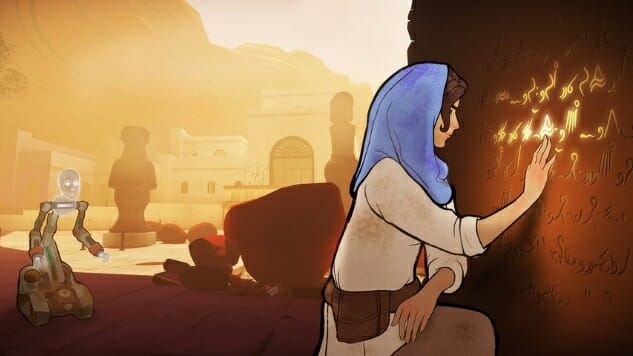
Just this past week I was playing a game called Sethian, a puzzle game I found on Itch.io, which fascinated me with its basis in linguistics. In it, the player must use a rudimentary translation system to decipher the strange symbols of an alien cipher, conversing with a computer to get answers on the nature of its being. It’s such an interesting look at language patterns and structure; trying to find the right glyphs and punctuation to communicate an idea based on what little you can glean from your dictionary creates a growing sense of panicked curiosity that is downright intriguing. At the time, I found myself wishing it could be incorporated into a bigger game.
Then this week I was blessed to run into Heaven’s Vault, a sci-fi adventure starring a young historian named Aliya, who must travel around the galaxy to solve a mystery surrounding the disappearance of a professor on her adopted planet. In order to find him, Aliya has to translate the writing etched into artifacts she finds on various moons and at dig sites, each providing a piece of the linguistic puzzle that will unlock more clues to an emerging mystery. It is equal parts history and detective work, highlighted by a reverse engineering process that gives a surprisingly insightful look into the work that actual archaeologists do to decipher languages. As Aliya encounters new inscriptions, she must use everything from root words and context clues to good old fashioned process of elimination to figure out what they mean. Untranslated phrases are broken down into glyphs, which can be filled in based on those that are already known, or by those you can guess the meaning of based on how they relate to other glyphs. It reminds me, somewhat, of the ongoing efforts to translate Etruscan, a language mostly known from tombstones and ossuaries. Heaven’s Vault illustrates the creativity and intellectual flexibility needed to fill in the blanks when translating a language with almost no text examples. It almost makes you feel like a real archaeologist.
That feeling, of course, is what I find most appealing about Heaven’s Vault. I was a passionate archaeology nerd as a kid, and I love that certain games (like The Sims 3: World Adventures, or the aforementioned Sethian) help me scratch that itch. The most exciting part of Heaven’s Vault is the point at which you realize you’re recognizing glyphs and retaining some of your newfound knowledge. Decoding each inscription gives me that same giddy sense of discovery I used to get when reading about ancient civilizations all those years ago.
Heaven’s Vault also has an astonishing level of self awareness given its subject material. As an academic study, archaeology is rife with colonialist narratives, and the game manages to subvert that by using it not as a means to exploit another culture, but rather, to inform the deductive reasoning skills needed to investigate and dismantle an existing power structure. The game also tackles a lot of related subjects, from capitalism and labor issues, to disability, slavery, free will, conspicuous wealth, interventionism, complicity, privilege, tech-enabled exploitation, and ethical resource allocation. And it does so in a way that is not designed to always make the player feel comfortable. In that sense, Heaven’s Vault actually contradicts a lot of what I learned in anthropology class, despite how authentic the linguistic decoding process may seem.
At any rate, Heaven’s Vault is great because its mechanics create a lot of narrative tension without absolving the game from the implications of its own themes. But also, it makes linguistics and ancient history as fun for everyone as they always have been for me. As more analysis emerges on its writing, my opinion on how the game handles its subject matter may evolve and change. But for now, Heaven’s Vault is really speaking my language.
Holly Green is the assistant editor of Paste Games and a reporter and semiprofessional photographer. She is also the author of Fry Scores: An Unofficial Guide To Video Game Grub. You can find her work at Gamasutra, Polygon, Unwinnable, and other videogame news publications.